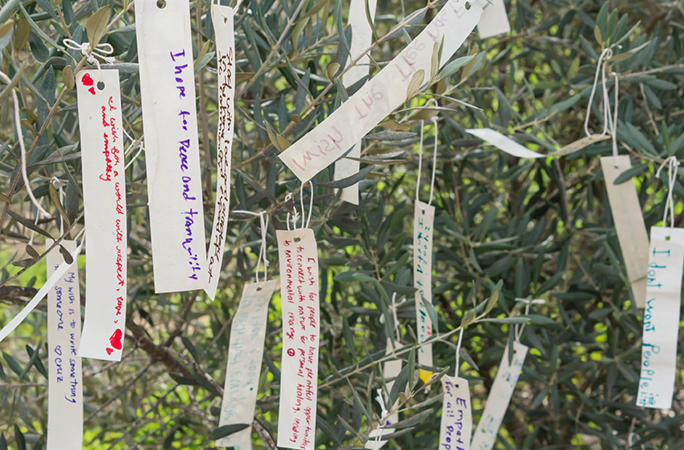Adama veshamayim. Heat of fire, drop of water. I can feel it in my body, in my spirit, in my soul.
This Wednesday evening marks Tisha B’Av, the “Jewish day of grief.” Literally translating to the ninth day of the Hebrew month of Av, this day of mourning recalls the destruction of the first and second Temples in Jerusalem and the resulting thousands of years of exile.
This day of mourning appears in The Book of Lamentations (Eicha in Hebrew, feminine of Eich, literally meaning “how”), whose words are brimming with references to hunger, food trauma, and lack of security. We read of Jeremiah, who prophesized the Temple’s destruction and subsequent famine and devastation that would befall the nation of Judah.
Tisha B’Av invites us to dwell in the darkness of those days and is preceded by a grieving period during which some Jews abstain from behaviors considered pleasurable or privileged. The last meal before fasting on Tisha B’av traditionally involves round food which appropriately bring to mind the cycle of life.
The themes of hunger and destruction remain ever-relevant today.
Hunger
An estimated 54 million people in the United States today are hungry, including 1 in 7 San Diego residents. And, while many are experiencing hardship during the coronavirus pandemic, it is these same marginalized communities who are most deeply affected by inequitable food access, limited healthcare, and loss of income.
Eich? (How?) How is it that so many people lack the security of knowing where their next meal will come from? How do we justify stocking up on food and essential items while our neighbors go hungry?
Destruction
All the while, glaciers are melting, sea levels are rising, soil is eroding, and greenhouse gasses are warming our planet. Whereas Americans make up just 4% of the world’s population, we produce 25% of the C02 pollution. To make matters worse, those least responsible for global warming will suffer most from its consequences.
Eich? (How?) How did we lose sight of the responsibility to steward our precious land? How do we reconcile the climate injustice we have contributed to?
Mourning awards us the privilege to pause: we are not expected to fix anything but invited to simply experience the magnitude of a loss. Perhaps grieving also allows us to release the sadness, and once released, perhaps we can reinvest our energy. This Tisha B’Av, consider a swift transition from mourning to moving, from pausing to participating.
At Coastal Roots Farm we are grateful for the privilege to participate in hunger-relief work and to lovingly steward our environment. We take to heart our responsibility as a Jewish community farm and, in remembering our history, work to not just feed those in need but to also give back to the land that gives so much to us. We are proud to practice regenerative and organic farming and contribute to a more secure future in the aftermath of a history defined in part by insecurity.
As we recognize this day of fasting, may we reflect on not just the hunger of thousands of years ago, but of the realities of today’s hunger across the world and in our own neighborhoods.
May we recognize our great fortune, examine the fabricated and fleeting feelings of food (and toilet paper) scarcity, and acknowledge the interconnectedness of hunger with many other types of oppression experienced by our vulnerable neighbors.
May we honor Tisha B’Av’s tradition of fasting as a lesson in humility: that even those of us with privilege or power are a few circumstances away from experiencing hunger ourselves.
May we listen closely to the prophecy of climate science experts as the Jewish people failed to listen to the prophet Jeremiah.
May the recollection of a burning Temple awaken us to a burning atmosphere as the greatest ecological threat of today.
This Tisha B’Av, may we award ourselves the opportunity to mourn our dark past and immediately work toward a brighter, more just future.
Let us mourn past and minimize continued suffering. I believe we can BOTH grieve past hunger AND feed each other now. I can feel it in my body, in my spirit, in my soul.
Written by Kesha Spoor, Philanthropy and Communications Manager at Coastal Roots Farm
